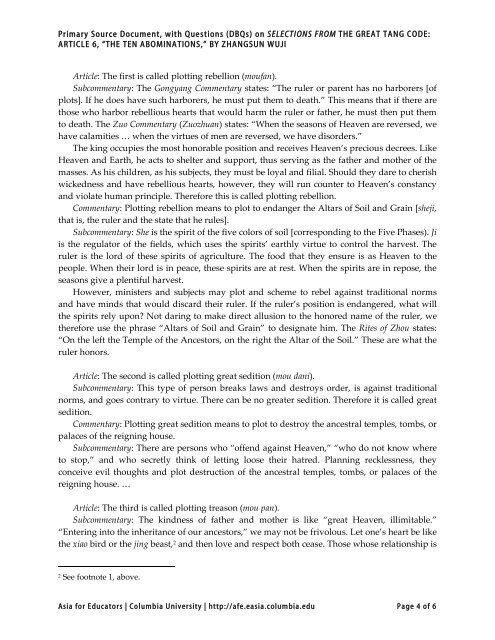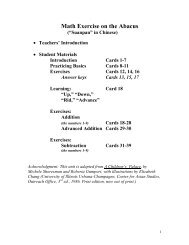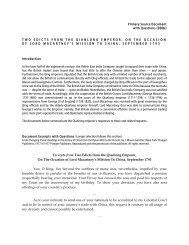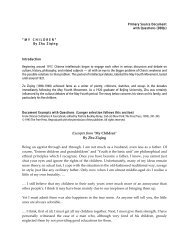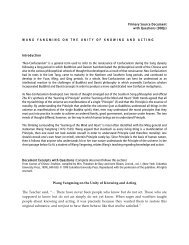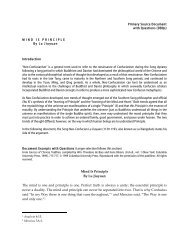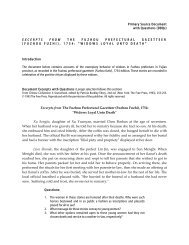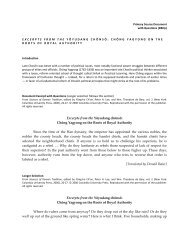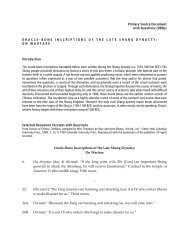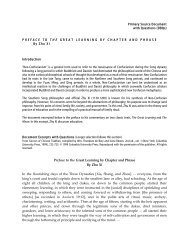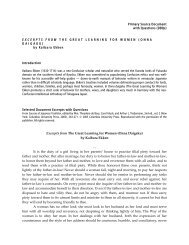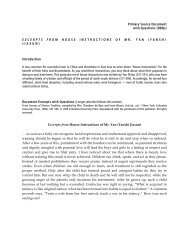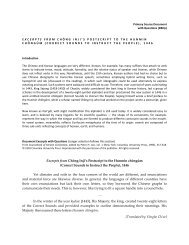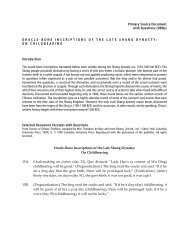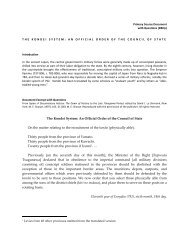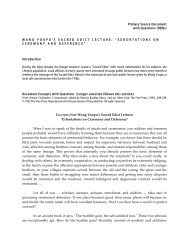The Great Tang Code: Article 6, "The Ten Abominations" - Asia for ...
The Great Tang Code: Article 6, "The Ten Abominations" - Asia for ...
The Great Tang Code: Article 6, "The Ten Abominations" - Asia for ...
You also want an ePaper? Increase the reach of your titles
YUMPU automatically turns print PDFs into web optimized ePapers that Google loves.
Primary Source Document, with Que stions (DBQs) on S EL EC TI ON S F ROM THE GREA T TA NG CODE:<br />
A RTICLE 6, “THE TEN A BOMINATIONS,” BY ZHA NGSUN WUJI<br />
<strong>Article</strong>: <strong>The</strong> first is called plotting rebellion (moufan). <br />
Subcommentary: <strong>The</strong> Gongyang Commentary states: “<strong>The</strong> ruler or parent has no harborers [of <br />
plots]. If he does have such harborers, he must put them to death.” This means that if there are <br />
those who harbor rebellious hearts that would harm the ruler or father, he must then put them <br />
to death. <strong>The</strong> Zuo Commentary (Zuozhuan) states: “When the seasons of Heaven are reversed, we <br />
have calamities … when the virtues of men are reversed, we have disorders.” <br />
<strong>The</strong> king occupies the most honorable position and receives Heaven’s precious decrees. Like <br />
Heaven and Earth, he acts to shelter and support, thus serving as the father and mother of the <br />
masses. As his children, as his subjects, they must be loyal and filial. Should they dare to cherish <br />
wickedness and have rebellious hearts, however, they will run counter to Heaven’s constancy <br />
and violate human principle. <strong>The</strong>re<strong>for</strong>e this is called plotting rebellion. <br />
Commentary: Plotting rebellion means to plot to endanger the Altars of Soil and Grain [sheji, <br />
that is, the ruler and the state that he rules]. <br />
Subcommentary: She is the spirit of the five colors of soil [corresponding to the Five Phases). Ji <br />
is the regulator of the fields, which uses the spirits’ earthly virtue to control the harvest. <strong>The</strong> <br />
ruler is the lord of these spirits of agriculture. <strong>The</strong> food that they ensure is as Heaven to the <br />
people. When their lord is in peace, these spirits are at rest. When the spirits are in repose, the <br />
seasons give a plentiful harvest. <br />
However, ministers and subjects may plot and scheme to rebel against traditional norms <br />
and have minds that would discard their ruler. If the ruler’s position is endangered, what will <br />
the spirits rely upon? Not daring to make direct allusion to the honored name of the ruler, we <br />
there<strong>for</strong>e use the phrase “Altars of Soil and Grain” to designate him. <strong>The</strong> Rites of Zhou states: <br />
“On the left the Temple of the Ancestors, on the right the Altar of the Soil.” <strong>The</strong>se are what the <br />
ruler honors. <br />
<br />
<strong>Article</strong>: <strong>The</strong> second is called plotting great sedition (mou dani). <br />
Subcommentary: This type of person breaks laws and destroys order, is against traditional <br />
norms, and goes contrary to virtue. <strong>The</strong>re can be no greater sedition. <strong>The</strong>re<strong>for</strong>e it is called great <br />
sedition. <br />
Commentary: Plotting great sedition means to plot to destroy the ancestral temples, tombs, or <br />
palaces of the reigning house. <br />
Subcommentary: <strong>The</strong>re are persons who “offend against Heaven,” “who do not know where <br />
to stop,” and who secretly think of letting loose their hatred. Planning recklessness, they <br />
conceive evil thoughts and plot destruction of the ancestral temples, tombs, or palaces of the <br />
reigning house. … <br />
<br />
<strong>Article</strong>: <strong>The</strong> third is called plotting treason (mou pan). <br />
Subcommentary: <strong>The</strong> kindness of father and mother is like “great Heaven, illimitable.” <br />
“Entering into the inheritance of our ancestors,” we may not be frivolous. Let one’s heart be like <br />
the xiao bird or the jing beast, 2 and then love and respect both cease. Those whose relationship is <br />
<br />
2 See footnote 1, above. <br />
<strong>Asia</strong> <strong>for</strong> E duca tors | Columbia University | http ://afe.easia.columbia.edu Page 4 of 6


